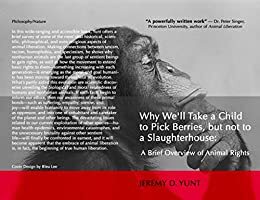A concise history of animal rights philosophy
4 steloj
Also published as Suffering, Empathy, and Ecstasy: Animal Liberation as the Furthest Reaches of Our Moral Evolution, the short book Why We'll Take a Child to Pick Berries but not to a Slaughterhouse gives a concise history of our philosophical stances towards animal cruelty and exploitation, showing how attitudes have varied widely from Rene Descartes' assertion that animals are mere automatons to St Francis of Assisi's belief that animals could benefit from his preaching of the bible. It's a fascinating read which also encouraged me to note down a number of other authors, expanding my reading and thinking even further. Despite, as I understand it, the book initially being published for an academic audience, I found it easily accessible for a layperson. Yunt's ideas about animal liberation being the next stage in human moral evolution chime strongly with my own perceptions so I already agreed with much of what he …
Also published as Suffering, Empathy, and Ecstasy: Animal Liberation as the Furthest Reaches of Our Moral Evolution, the short book Why We'll Take a Child to Pick Berries but not to a Slaughterhouse gives a concise history of our philosophical stances towards animal cruelty and exploitation, showing how attitudes have varied widely from Rene Descartes' assertion that animals are mere automatons to St Francis of Assisi's belief that animals could benefit from his preaching of the bible. It's a fascinating read which also encouraged me to note down a number of other authors, expanding my reading and thinking even further. Despite, as I understand it, the book initially being published for an academic audience, I found it easily accessible for a layperson. Yunt's ideas about animal liberation being the next stage in human moral evolution chime strongly with my own perceptions so I already agreed with much of what he has to say, yet also discovered new concepts and angles to ponder which was particularly satisfying.

